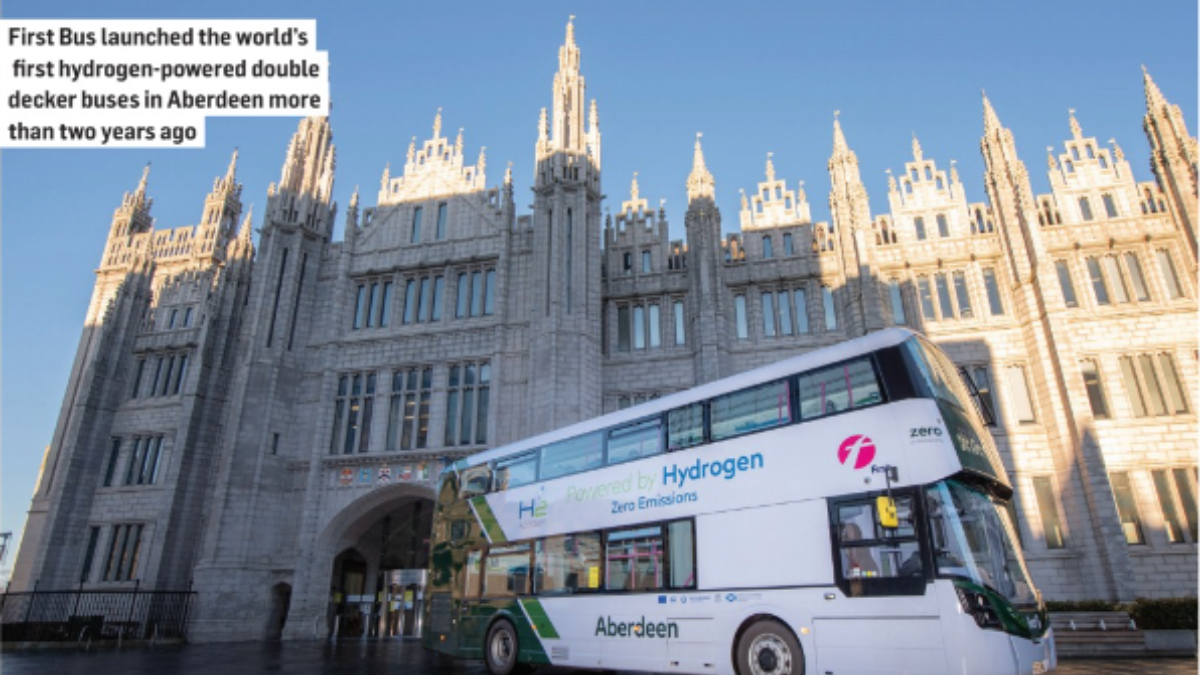Modern 21st-century buses are leading what is seen as a transport revolution. Every day, the fleets operating on our roads become greener.
New hydrogen and electric vehicles are emission-free, and they also remove other potentially polluting vehicles from the road – for instance, one double-decker bus can replace 75 cars.
Add to that the fact that buses can help level up societies and sustain and build communities, and it is clear that they are ideal for the post-carbon world we are moving towards.
First Bus is Scotland’s largest operator, running fleets in Glasgow and Aberdeen. It is fully committed to sustainable solutions and aims to achieve zero emissions across its 850-vehicle fleet by 2035.
First Bus launched the world’s first hydrogen-powered double-decker buses in Aberdeen more than two years ago, and has now begun to augment these with a fleet of 24 electric vehicles.
“Bus is probably at the forefront of the transport decarbonisation journey,” says Duncan Cameron, First Bus’s Managing Director. “Both our customers and our staff are really starting to recognise the benefits.
“That’s particularly true of the younger generation, who talk about not needing to own a car. Being able to make a green journey is very important to them.”
Cameron admits that his company is still on a learning curve. Most operators run their buses for 15 years or so and they have really only just started with these new technologies.
“When it comes to things like reliability and total cost of ownership, we’re in our infancy. In the case of both hydrogen and electric, it’s a matter of testing it out and seeing.”
Each of the two sustainable fuel sources has its own advantages and disadvantages, he adds. “With electric buses, the power supply is currently easier to obtain sustainably than hydrogen, though the latter will get easier in time as production ramps up. It’s also cheaper than hydrogen and the vehicle engineering is easier.
Electric vehicles have a lower range than hydrogen vehicles and, as a result, buses scheduled to do a lot of mileage over the course of a day – around 200 miles – cannot be converted to zero emissions quite yet.
First Bus has been introducing electric vehicles into its fleet in Glasgow since January 2020. Its Caledonia Depot in the city is the biggest in the UK – and nearly 60 per cent of the fleet operating from it is now zero emission
Interestingly, this is also the country’s biggest electric vehicle charging hub. “We are all really proud of these milestones and achievements,” Cameron says. ‘It creates a really big feelgood factor and people are tremendously positive about it.”
He admits that the switchover from fossil fuel-powered vehicles has not been without its challenges. “I’m not making any criticism, but you need to remember that this is still new technology.
“The reliability on the roads from a service point of view has been strong,” he adds, and both First Bus and the thousands of passengers who use its services each day are pleased with their introduction to the fleet. The Alexander Dennis-built electric buses still have to have their range fully evaluated, especially on the coldest of winter days when the temperature can cause it to drop significantly.
The company does continue to operate diesel buses, but all these operate to Euro 6 standards, meaning their emissions are as clean as possible, mitigating their environmental impact.
First Bus also places significant emphasis on community involvement: its services make communities more inclusive and it has a lot of interaction with schools.
“In both Glasgow and Aberdeen, we are working closely with elected members and trying to build a framework that allows for two-way communication with communities. So far, this has been really positively received.”
Significant steps, then, have been taken to invest in zero-emission buses and this will continue as First Bus works hard to deliver the greenest, and best value for money, transport option. l
Partner Content in association with First Bus



